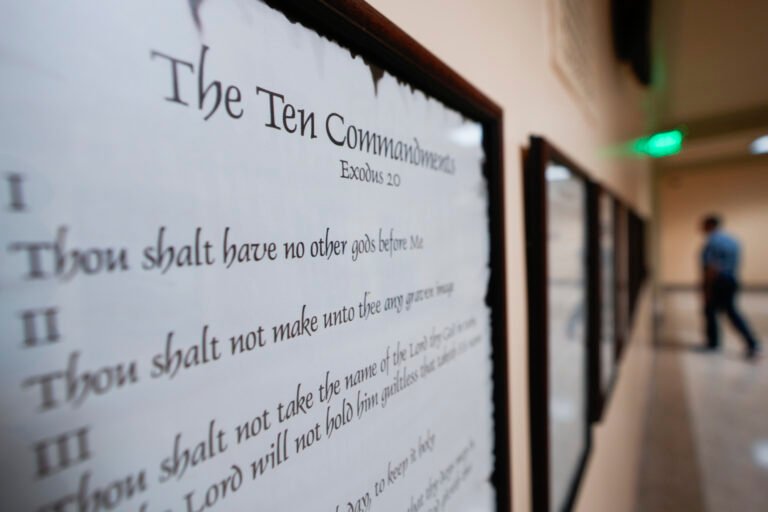Religious Law
Change in establishment clause test doesn’t save Louisiana’s Ten Commandments law, 5th Circuit says

A version of the Ten Commandments is posted, along with other historical documents, in a hallway of the Georgia Capitol in Atlanta. (Photo by John Bazemore/The Associated Press)
A Louisiana law requiring public schools to display the Ten Commandments in every classroom violates the establishment clause of the First Amendment, a federal appeals court ruled Friday.
The 5th U.S. Circuit Court of Appeals at New Orleans ruled for an interfaith group of families that challenged the law.
Education Week (via How Appealing) and Reuters have coverage of the June 20 opinion.
The 5th Circuit upheld a preliminary injunction that blocked implementation of the law, known as House Bill 71.
The law specified the wording of the Ten Commandments that should be used; required that the commandments be printed in large, easily readable font; and said a “context statement” about the history of the Ten Commandments in public education should be part of the display.
The plaintiffs said the wording represented a protestant version of the Ten Commandments.
The appeals court cited a 1980 U.S. Supreme Court decision, Stone v. Graham, which struck down a Kentucky law that also required Ten Commandments displays in public school classrooms.
Louisiana had argued that Stone is no longer good law because it used the Lemon test, which was abandoned by the Supreme Court in the case of a praying football coach, Kennedy v. Bremerton School District.
The Lemon test, established in Lemon v. Kurtzman in 1971, said government action doesn’t violate the establishment clause when it has a significant secular or nonreligious purpose, does not have the primary effect of advancing or inhibiting religion, and doesn’t foster excessive entanglement between government and religion.
The 2022 Kennedy decision adopted a new test to evaluate establishment clause cases that is based on historical practice and understanding.
Despite the abandonment of the Lemon test, Stone remains good law, the 5th Circuit said. And the Ten Commandments display in public classrooms is unconstitutional, even when using the new historical practice test, the appeals court said. The 5th Circuit cited the plaintiffs’ expert, who said there is no evidence of a long-standing historical tradition of permanently displaying the Ten Commandments in public school classrooms.
Louisiana also argued that being an “offended observer” of the religious display wasn’t sufficient to confer standing to sue. The state cited a concurrence by Justice Neil Gorsuch in support of the argument and urged the 5th Circuit to overturn precedent.
But the plaintiffs allege more, the appeals court said in an opinion by 5th Circuit Judge Irma Carrillo Ramirez, an appointee of former President Joe Biden.
“If H.B. 71 goes into effect, students will be subjected to unwelcome displays of the Ten Commandments for the entirety of their public school education,” Ramirez wrote. “There is no opt-out option.”
The plaintiffs were represented by the American Civil Liberties Union; the ACLU of Louisiana; Americans United for Separation of Church and State, a nonprofit organization; and the Freedom From Religion Foundation, a nonprofit organization, according to a June 20 press release. Simpson Thacher & Bartlett was the pro bono counsel.
The case is Roake v. Brumley.
See also:
Ten Commandments displays should not be required in public school classrooms, ABA House says
Write a letter to the editor, share a story tip or update, or report an error.

